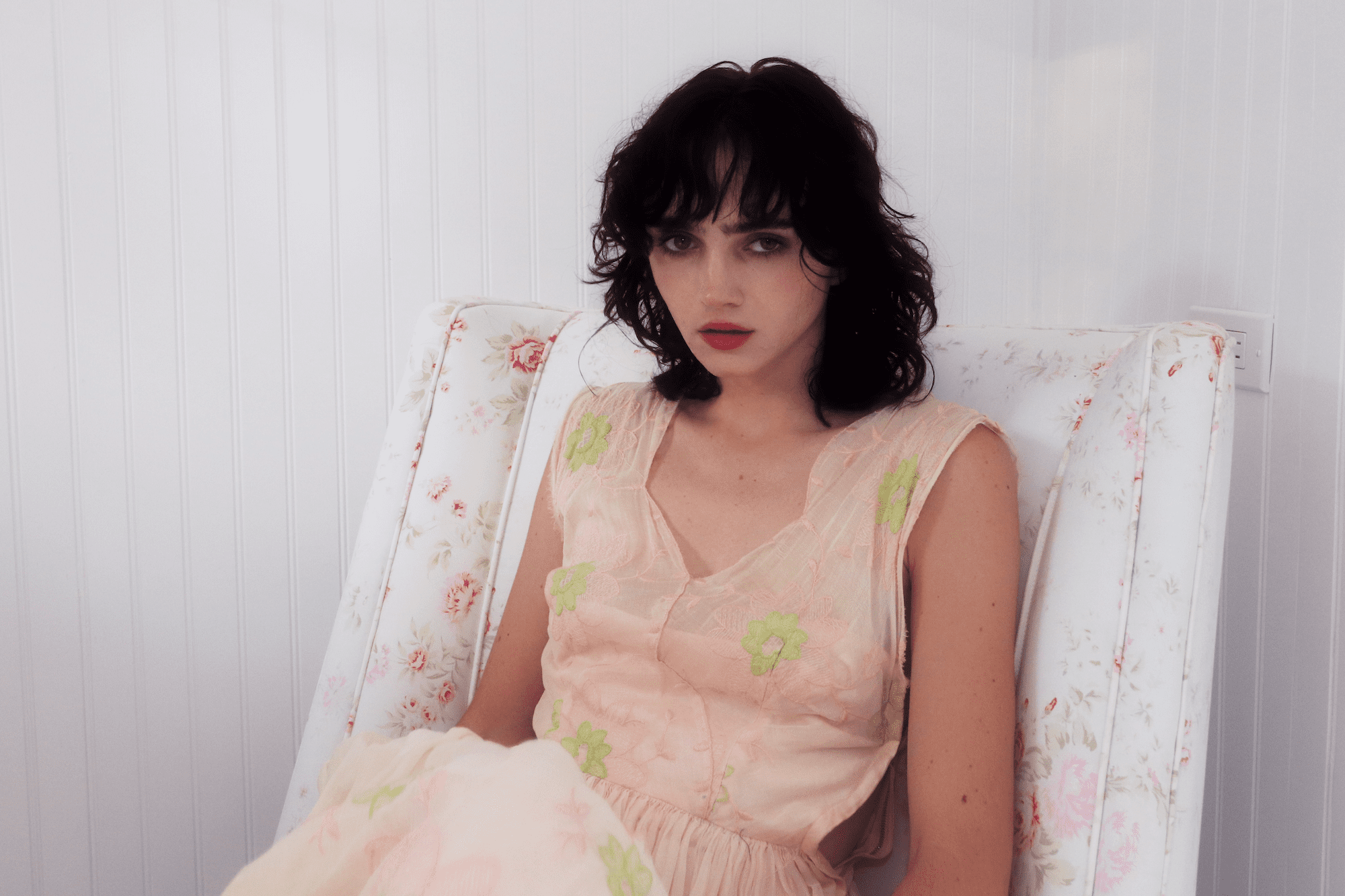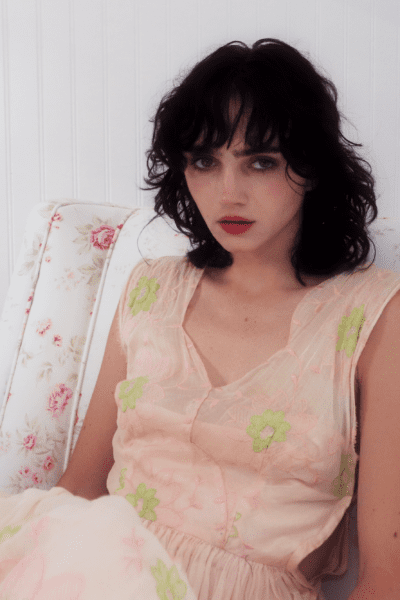

In her senior year at Bennington College in Vermont, Dana Foote, a music composition major, was required to present a concert of original music. Foote gathered together some of her school peers, the songs she wrote, and she called the group Sir Chloe, a nod to the name her mother almost gave her as well as her androgynous style.
Three years later, 25 year-old Foote has graduated from music school and thrust herself into the “real” music world—and she’s been well-received. Her breakout single “Animal” has over 12 million views across social media platforms, another of single, “Michelle” is rising on cosplay TikTok.
Out today via Los Angeles-based imprint Terrible Records, Sir Chloe’s debut EP, Party Favors is an impressive first sampling of Foote’s evocative, interrogative songwriting and grunge-mumble voice, which results in music that could be the lovechild of singer-songwriter Mitski and post-punky garage rock band The Strokes.
Foote sat down with Audiofemme to chat about her journey to this debut EP, the bandmates that helped make Party Favors possible, and the tumultuous relationships that inspired her love-aloof lyrics.
AF: At just 25, your skill as a musician and a songwriter is impressive. You must’ve started young. Was there a lot of music in your home growing up?
DF: Yeah – my dad and uncle are both musicians. My dad is a guitarist and my uncle is a composer; he plays a lot of instruments. We played a lot of music growing up and my brother took up drums from a young age. We were all kind of playing music all the time. I also grew up in church and went to Jesus camp for five years and there was a lot of singing there, which probably had something to do with it as well.
AF: Did you grow up in LA?
DF: I grew up in Connecticut. Old Greenwich.
AF: Did you start writing music in college, or did you write songs before that time?
DF: I started writing songs my junior year of high school. Before that I was in bands and we did a lot of covers. It was kind of like working up from covers to writing my own stuff and then I started writing in my junior year of high school and stuck with it.
AF: Do you tend to write on guitar, or other instruments?
DF: Yeah, I write on guitar and piano.
AF: Who else is makes Sir Chloe tick? You work with some peers from school, right?
DF: I write the melody and the words and I’ll usually write a couple of loose chords and then I’ll send that to [guitarist and producer] Teddy O’Mara who produces the music with me, and he’ll sometimes make chord progressions a little bit more intriguing and he’ll start the arrangements in Logic and then we’ll kind of send a song back and forth until it’s almost complete or generally you have a clear sense of what the feel is going to be. Then, we bring it to the band which is currently Austin Holmes on bass—who is a good childhood friend of Teddy’s—and my brother, Palmer Foote, on drums.
AF: How did you meet Teddy?
DF: We had a few classes together starting his freshman year, my sophomore year. We were both fans of each others’ work and he produced a couple of songs for me back when I was just a solo act and I really liked working with him so when I put the band together, he was the first person I asked. He’s also a fantastic guitarist so I really wanted him around.
AF: It’s so cool to have shared background that way. I love the story of how you named the band, why did you decide to put Sir in front of the name? And tell me about your relationship to the name Chloe?
DF: I’ve always loved the name for a lot of reasons – it’s a cute name and it’s the name I tell people when I don’t want to tell them my real name, like someone at a bar. And also the song “Chloe in the Afternoon” by St. Vincent – I’ve always loved that song so it’s a little bit of a nod to that. Chloe has always been a weird second name for me in a lot of ways and I’ve felt very connected to that name. And then I put Sir in front of it because I wanted something androgynous. I feel like my gender performance is a little bit more middle of the spectrum. I wanted something that could be perceived either way and was a little tongue in cheek perhaps.
AF: Tell me a little about how classical music and the classical training you’ve received has informed your approach to rock music?
DF: Gosh, well, I think there’s a lot of ways it probably informs it that I’m not necessarily aware of. But primarily I would say that it made me want to use more – I don’t want to say the word “smarter” chord progressions, but I think it really opened, it made me understand themes in music and the importance of repetition and the voicings of chords and learning how different voicings of chords can really mean different things and sound totally different. Debussy is a great example because all of his chords are so baroque and whimsical and wild and it creates a world when you listen to it. I felt that way about a lot of composers that I studied, where you listen to it and get transported to a different universe and then you get to learn exactly what they did and exactly why it makes you feel that way. I think it helped me understand where, like if I’m thinking about an idea, classical music helps me turn the idea into a tangible melody with a chord progression and also [be] more experimental.
AF: You said you grew up in church and did a lot of church singing – are you still religious? And also are you fascinated by the occult or other ways of worshipping, given the dark, mysterious undertones in some of your writing?
DF: I love religion, I’ve always been very interested in it. Growing up on the East coast, specifically in the Northeast, there’s a lot of intense religious imagery that I was fed a pretty consistent diet of growing up. In high school we had chapel every Monday morning [for] announcements and sometimes people would sing, but it was in a church, which I believe is one of the more dramatic buildings you can be in. I love churches. I love how small they make you feel, I love the way they sound on the inside, and the general architecture and how everything, every seating area is super uncomfortable. I love it all. It’s so dramatic. When I was looking at high schools, we would visit schools that would have big crosses with extremely lifelike Jesuses hanging in the cafeteria and stuff like that. It was always around growing up. My mom grew up pretty Catholic and her parents were Catholic, and I had a lot of experience with church and I just got fascinated with the community of it. That kind of led to being interested in other religions, and community and lifestyle around other religions, because I do think that religion in America is a very fascinating thing to me. The intensity of it all. To be honest this is the most I’ve talked about church probably in years. I don’t think about it that much but I know it’s probably in my unconscious brain somewhere swimming around.
AF: Let’s talk about “Animal,” your breakout track. I love that the lyrics seem to express this resistance to being someone’s romantic obsession and I sense this in a lot of your songs. Without getting too personal where does that come from for you? Why is that something you write about?
DF: I’ve thought about this too because I didn’t really realize this until we put the EP together and then I listened to through it and I was like—wow, I have a really common theme here. I would say, like the beginning of college or after my freshman year of college, I was starting to learn about what boundaries were and the importance of setting them. Part of it is that, and kind of saying like, “I’m seeing this doesn’t work for me so I’m going to do what’s best for me right now. And I’m going to trust myself to make that decision.” I think when you’re first starting to set boundaries it’s a scary leap to say that and do that. So I think a lot of those older songs were processing the feelings behind setting boundaries. “Animal” was about breaking up with somebody that didn’t want to be broken up with and it ended up being a very long drawn-out process where I didn’t feel like I was being listened to and it was very frustrating. Additionally it’s about looking back in hindsight and being like, this is where I should have set the boundary and I didn’t so I am going to retell this story and make myself sound more empowered than I feel right now.
AF: I really like how you characterize the person in “Michelle” as a monster from Hell and I wanted to know – is that somebody you actually know?
DF: It’s somebody I actually know.
AF: What inspired that song?
DF: Well, I was dating somebody and it ended really badly. It was very crazy and kind of a whirlwind situation where every time I interacted with her I was like, “Oh my God, I can never speak to this person again.” But I kept getting sucked back in. She would just have this way about her that was really hard to say no to. I kept crawling back. And I was really mad at myself. At the time I was really trying to stay out of trouble and here I was just putting myself in the most compromising position all the time.
AF: What are your goals for music?
DF: We have a few. The big thing is that we want to play shows. That’s the whole reason why any of us got into this. Playing shows is our favorite thing to do [as a band]. That’s the priority and I’d like to be able to have a career in music and be able to hopefully compose in the future and work with musicians that I admire. The big thing is creating a community around music and connecting with people. Being able to play music for as long as we can would really be the ultimate goal.
AF: What are you most proud of on this EP?
DF: I’m really proud of how it feels like we’re finding our sonic identity with this. The way the songs have changed—like listening to the demos from when I first wrote these songs versus listening to them now—it really feels like I’m watching my children grow up.
Follow Sir Chloe on Facebook and Instagram for ongoing updates.

